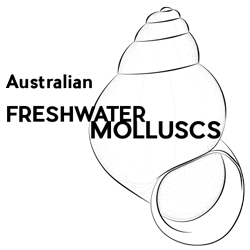
Species in the B. tasmanica group have small shells (length 1.2-2.8 mm) with a depressed spire and open umbilicus. The penis is simple.
This species has a very depressed shell and is also unusual among Beddomeia members in usually maintaining a pale colour, unlike most species which, despite having a white shell, have the shell surface stained or coated so that they appear to be brown or even black.
Beddomeia pallida Ponder & Clark, 1993
Class Gastropoda
Infraclass Caenogastropoda
Order Littorinida
Suborder Rissoidina
Superfamily Truncatelloidea
Family Beddomeiidae
Original name: Beddomeia pallida Ponder & Clark, 1993. In Ponder, W.F., Clark, G.A., Miller, A.C. & Toluzzi, A. (1993). On a major radiation of freshwater snails in Tasmania and eastern Victoria: a preliminary overview of the Beddomeia group (Mollusca: Gastropoda: Hydrobiidae). Invertebrate Taxonomy 7: 501-750.
Type locality: Headwaters of Second River, 7.5km east along Doaks Road from Lilydale, Tasmania.
Under stones and leaves in tributary streams. The white egg capsules are laid on the undersides of rocks and are like those of other species of Beddomeia - dome-shaped, with broad attachment base, covered with minute, mainly white sand grains and other fragments and containing a single egg. Development direct.
This species is known from tributaries of the Second River and few nearby streams in north-eastern Tasmania.
All species of Beddomeia are geographically isolated and have restricted ranges.
Ponder, W. F., Clark, G. A., Miller, A. C. & Toluzzi, A. (1993). On a major radiation of freshwater snails in Tasmania and eastern Victoria: a preliminary overview of the Beddomeia group (Mollusca: Gastropoda: Hydrobiidae). Invertebrate Taxonomy 7: 501-750.